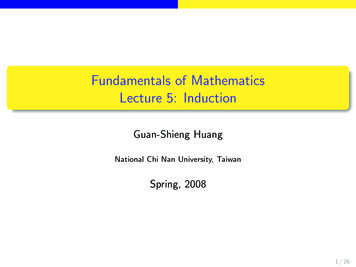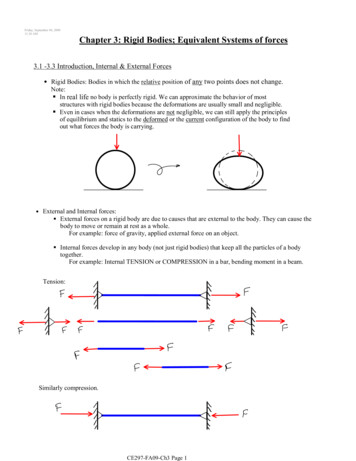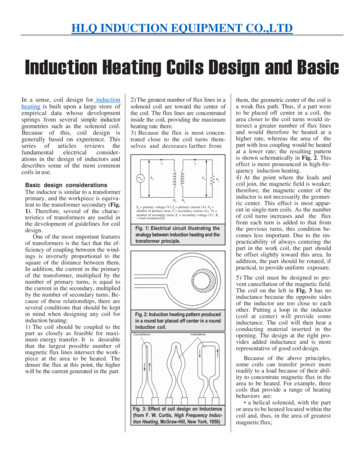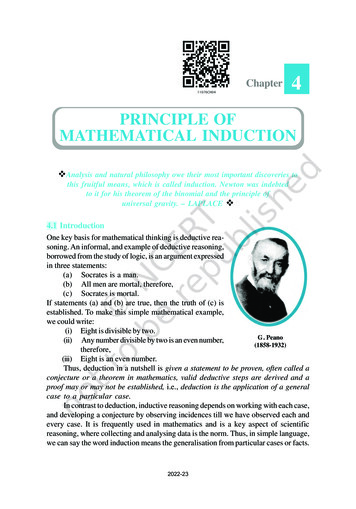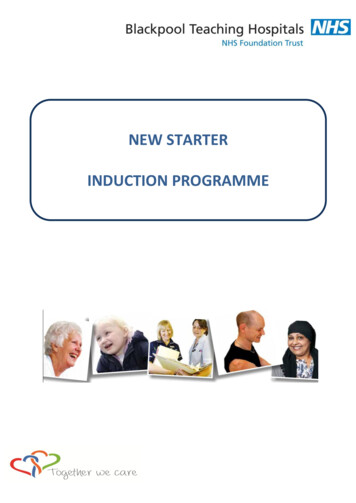
Transcription
AppropriateBodies Guidance:Induction and theEarly CareerFrameworkMarch 20211
ContentsContents21423456Summary1.1Expiry or review date41.2What legislation does this guidance refer to?41.3Who is this guidance for?4Overview52.1Introduction52.2About this guidance6Roles and responsibilities83.1Who can be an appropriate body?83.2Roles and responsibilities83.3Monitoring of support83.4Causes for concern143.5Other regulatory restrictions on appropriate body operations15ECF fidelity checking174.1An ECF-based induction174.2Level of ECF fidelity checking184.3Responsibility for ECF fidelity checking194.4How and when to conduct ECF fidelity checks194.5Appropriate bodies delivering ECF training26Assessment and progress reviews285.1Monitoring of assessment285.2Progress Reviews29The appropriate body market: self-regulation and next steps326.1The appropriate body market326.2Self-regulation326.3Delivering a high quality service336.4Appropriate body networks336.5Future direction of the appropriate body market342
7Further information35Appendix A - ECF Fidelity Checking Template: Core Induction Programme 36Appendix B - ECF Fidelity Checking Template: School-based InductionProgramme42Appendix C - Early Career Teacher: Formal Assessment Template54Appendix D - Early Career Teacher: Progress Review Template633
1 Summary1.1 Expiry or review dateThis guidance will be kept under review and updated when necessary.1.2 What legislation does this guidance refer to? Sections 135A, 135B and 141C(1)(b), of the Education Act 2002and The Education (Induction Arrangements for School Teachers)(England) Regulations 2012, as amended. This guidance contains non-statutory recommendations andsuggestions for good practice, outlining what appropriate bodies‘may’ or ‘can’ do where they have discretion over how they operateand implement the requirements of legislation and expectations ofthe statutory guidance.1.3 Who is this guidance for?This guidance is for appropriate bodies: Local authorities Teaching school hubs 1 Other organisations which the Secretary of State has determinedcan act in this roleWhen the new regulation and guidance take effect from 1st September 2021, teachingschool hubs will replace teaching schools as the designated schools eligible to operate asappropriate bodies.Information on teaching school hubs is available at: https://gov.uk/guidance/teaching-schoolhubs14
2 Overview2.1 IntroductionTransforming support for early career teachers (ECTs) is at the heart of ourTeacher Recruitment and Retention Strategy (2019) 2 which recognised thatthe steepest learning curve occurs in the first few years of a teacher’s career,and that in the past, too few teachers have had access to structured supportor dedicated time for evidence informed professional development.The Department is delivering this commitment through the national roll-out ofthe Early Career Framework (ECF) 3 reforms from September 2021. The ECFreform will facilitate a step change in the structured support ECTs receive.The ECF clearly sets out what new teachers are expected to ‘learn about’ and‘learn how to do’ based on expert guidance and the best available researchevidence. The ECF was designed in close partnership with the sector andaims to support ECTs to develop their teaching practice, knowledge andworking habits to help them establish a successful career in teaching.From September 2021, induction for teachers joining the profession will beextended to two years and, underpinned by the ECF, will provide them with astructured programme of development, support and professional dialogue.These reforms sit at the heart of our strategy and will include an expectationthat ECTs will have a dedicated mentor and a requirement that they have areduced timetable in their first two years of teaching following qualification,giving them the time and support needed to focus on their professionaldevelopment so that every new teacher is supported to lay the foundations fora fulfilling and rewarding career in teaching.Appropriate bodies will play a key part in these reforms through their role inteacher induction. From September 2021, as well as ensuring that ECTsreceive their statutory entitlements, they will ensure that regard is had to theamended statutory guidance and that ECTs are fairly and consistentlyassessed. Appropriate bodies will also be expected to check that ECTs arereceiving a programme of support and training based on the ECF.Teacher Recruitment and Retention Strategy available her-recruitment-and-retention-strategy3Early Career Framework available at: reer-framework25
2.2 About this guidanceThis guidance comes into effect from September 2021 when new regulationson induction will apply. It also suggests ways in which appropriate bodies andthe schools they work with can prepare in advance of the changes.Through the Department’s engagement with the sector during 2020,appropriate bodies said that they needed clarity on how their role waschanging under the ECF reforms, so this guidance aims to: outline appropriate body roles and responsibilities from September2021share and encourage good practice on how appropriate bodiesmight deliver their roleSome parts of this guidance will refer to legal requirements as set out inregulations and expectations set out in statutory guidance, while other partsare suggestions of good practice that we have heard about throughengagement with the sector. For this reason, it is important that this guidanceis read alongside the Induction statutory guidance and regulations 4.The guidance is designed to recognise that appropriate bodies varysignificantly in context and how they operate. This means that suggestedgood practice that is suitable for one appropriate body may not work well forothers. It is expected that in using this guidance appropriate bodies may useor adapt suggestions of good practice in the way that suits their needs.The focus of the guidance is to explain the core elements of the appropriatebody role, detail how these are updated in the new regulations and updatedstatutory guidance, particularly around how the ECF relates to expectationsaround induction, and to offer practical suggestions drawn from discussionwith the appropriate body sector. These offer ideas on how appropriate bodiesmay consider implementing these changes and supporting the schools theywork with to transition to new requirements and expectations around theinduction they provide for their ECTs.In the appendices of the guidance there are a number of template formswhich may be used or adapted to appropriate bodies’ own systems. Theyprovide a clear guide to the type and extent of evidence that appropriatebodies are expected to collect from schools in respect of assessment,progress reviews and checks on the induction programme’s fidelity to theECF.Induction for early career teachers (England) available ction-for-early-career-teachers-england46
This guidance uses the terms:‘headteachers’ to mean headteachers or those undertaking the roles andresponsibilities of a headteacher, for example, principals.‘ECT’ to mean early career teacher, referring to a newly qualified teacher intheir first or second year of induction.7
3 Roles and responsibilities3.1 Who can be an appropriate body?From September 2021, regulations will provide that the appropriate bodyfunction can be performed by the following bodies: Local authorities Teaching school hubs Other organisations which the Secretary of State has determinedmay act in this role3.2 Roles and responsibilitiesAppropriate bodies support the schools and teachers they work with in avariety of ways and their core functions are central to ensuring that schoolsprovide adequate support to teachers at the start of their teaching career.Appropriate bodies have two key roles which will be described in thisguidance: Monitoring of support – appropriate bodies willo check that early career teachers are receiving their statutoryentitlements, and that regard is had to the statutory guidance.o provide ECF fidelity checks, ensuring schools are supported toprovide ECTs with an ECF-based induction. This new aspect ofthe monitoring role is explained in more detail in Chapter 4.Monitoring of assessment – appropriate bodies will make the finaldecision as to whether the ECT has satisfactorily met the Teachers’Standards 5, based on the headteacher’s recommendation.3.3 Monitoring of supportIndependent quality assurance of statutory induction, through the role of theappropriate body, is important for ensuring that schools provide adequatesupport for their early career teachers and that regard is had to the statutoryguidance.Establishing relationships with schoolsThe level of support a school might need from its appropriate body in order toprovide a suitable ECF-based induction period will vary depending on theirTeachers’ Standards are available at: ndards58
context and circumstances so it is helpful to introduce key members of staffworking within the appropriate body to the headteacher and induction tutorearly on to establish a relationship.Through establishing a good relationship with a school, the appropriate bodycan satisfy itself that the headteacher understands their statutory duties. Theappropriate body could also use this opportunity to understand what provisionhas been made for statutory induction and where the school might benefitfrom additional support and guidance.Appropriate bodies may provide support to schools by offering: Introductory sessions, training or briefings for induction tutors,mentors and ECTs to make sure they understand their roles andresponsibilities. An induction handbook for ECTs, induction tutors, mentors, andheadteachers which could provide information on key inductionareas such as statutory entitlements. Additional advice for induction tutors such as action plantemplates for ECTs who need additional support.This type of support could be particularly helpful for schools with newinduction tutors; schools which have not recently had ECTs; or those whoappoint fewer ECTs and may be less familiar with the requirements ofinduction.If a headteacher requests guidance or support on how to offer an ECF-basedinduction, appropriate bodies can direct schools to a provider-led inductionprogramme 6, where it is available. Alternatively, appropriate bodies cansignpost schools to the high-quality materials and resources designed by fourproviders and accredited by the DfE, also referred to as a ‘Core InductionProgramme’.Support prior to the start of inductionOnce an appropriate body has received notification from the headteacher thatthey have appointed an ECT who is not currently undergoing induction withthat appropriate body, the appropriate body is expected to notify the TeachingRegulation Agency 7 that the ECT has started, or will start, an induction period.Further information on the approaches to delivery of an ECF-based induction is available ll-out7The Teaching Regulation Agency is an executive agency of the Department for Education.Further information can be found at: ngregulation-agency/about69
The appropriate body should then begin checks of the support in place. Thesechecks should start as soon as possible to ensure necessary staff andarrangements are in place before induction begins.Pre-induction checklistWHAT to checkThe headteacher has provided asuitable post for inductionThe headteacher has verified thatthe award of QTS has been madeThe ECT is provided with a namedcontact (or contacts) within theappropriate body with whom to raiseconcernsThe Mentor has the ability andsufficient time to carry out their roleThe Induction tutor has the abilityand sufficient time to carry out theirroleThe school is providing a reducedtimetable in addition to PPAThe headteacher has confirmed thetype of ECF-based induction theyare providing (see Chapter 4 forfurther detail)WHY check it (to ensure that )The ECT has appropriateopportunity to complete inductionThe ECT meets the requirements tocommence inductionThe ECT has appropriate contacts ifthey need to raise concerns abouttheir inductionThe Mentor has sufficient time tofacilitate the support they provideECTs with during inductionThe Induction tutor has sufficienttime to facilitate the support theyprovide ECTs with during inductionThe ECT has sufficient time toengage with the ECF-basedinduction programme; this is also astatutory requirementThe appropriate body can apply therequired level of checks to ensurethe ECT has access a high qualityknowledge-based inductionMost of these initial checks can be done through correspondence with theheadteacher and/or the induction tutor. Where the appropriate body asks theschool to supply information or evidence that they have fulfilled their duties,they should be mindful of the workload this might create for the school and theproportionality of the request.Reductions to inductionIt takes time to develop the skills needed for a successful career in teachingwhich is why all ECTs are entitled to a two-year induction programme.As set out in the Induction statutory guidance, in exceptional individual cases,a headteacher or ECT might request a reduced induction period on the basisthat the ECT meets the Teachers’ Standards. This will need to be evidenced,and the appropriate body should consider whether the ECT has significantexperience teaching whole classes to the relevant standards. Appropriatebodies can reduce the length of the induction period to a minimum of one termat their discretion. In making this decision, the appropriate body shouldconsult the headteacher (in particular as to whether the ECT is meeting theTeachers’ Standards) and must always gain the agreement of the ECT.10
Reductions to the length of induction should only be granted in exceptionalcircumstances and are likely only to be appropriate for ECTs who havesignificant experience of teaching whole classes.Appropriate bodies should carefully consider what evidence is appropriate fordemonstrating significant teaching experience. This could include: referrals from previous employers confirming the type and length ofteaching experienceperformance management records or other documentation fromprevious employersa written submission from the headteacher or ECT addressing howprevious teaching experience was significant and how it met theTeachers’ StandardsAny reduction to the induction period should only be made on the basis thatthe ECT has met the relevant standards.Appropriate bodies should be particularly mindful of any ECT being deniedtheir entitlement to a two-year induction unnecessarily. If a teacher wishes toserve the full induction period they must be permitted to do so.Reductions to induction should never be used because the school does nothave the resource to offer a full-length induction.Part time ECTsAppropriate bodies have the ability to reduce the induction period for ECTswho are completing induction on a part time basis. The appropriate bodyshould only consider granting a reduction and bringing forward the finalassessment point once the ECT has completed a period covering but notequivalent to two school years.For example, an ECT starting induction in September 2021 and working0.5FTE would ordinarily be expected to complete a four-year inductionfinishing in summer 2025, but can be considered for a reduction in summerterm 2023. A prerequisite for considering reduction past the two-year point willbe that the ECT is considered to be meeting the Teachers’ Standards. Inmaking this decision, the appropriate body should consult the headteacherand must always gain the agreement of the teacher concerned.Support during inductionOver the course of the induction, the appropriate body will continue to checkthat the ECT is receiving their entitlements and that regard is had to thestatutory guidance.11
To check ECTs’ access to entitlements, appropriate bodies mayconsider: Contacting some ECTs in between assessments via phone oremail to check access to entitlements. Offering training for ECTs to make them aware of what theyshould expect and how to contact appropriate bodies/unions iftheir entitlements are not met. Conducting surveys of randomly selected ECTs to check accessto entitlements.Appropriate bodies are encouraged to check access to these entitlements atthe formal assessment checkpoints, as a minimum. Some appropriate bodiesmay choose to conduct additional visits/observations or gather informationfrom schools outside of the formal assessment period and choose to build inadditional entitlement checks as part of their processes, as resource andcapacity allows. This is permitted, provided that they have the agreement ofthe school.Ongoing quality assurance of induction – appropriate body checklist:WHAT to checkWHY to check it (to ensure that )In the first year of induction, theThe ECT has sufficient time to engageECT has a reduced timetable of no with the ECF-based inductionmore than 90% of the timetable of programmethe school’s existing teachersIn the second year of induction,The ECT has sufficient time to engagethe ECT has a reduced timetablewith the ECF-based inductionof no more than 95% of theprogrammetimetable of the school’s existingteachersAn ECTs teaching is observed atThe ECT has fair and effectiveregular intervals and has promptassessment of their teaching practice,follow up discussionconduct and efficiency against theTeachers’ StandardsAn ECT observes experiencedteachersThe ECT has appropriate opportunityto observe effective teaching practiceThe ECT has access to astructured induction programmebased on the ECF (see Chapter 4)The ECT has access a high qualityknowledge-based induction12
When planning how to monitor support for ECTs across theirregistered schools, appropriate bodies may consider: Committing to visit a minimum percentage of their total schoolsper academic year. Allowing for additional visits by exception or at the request of aschool if a problem is identified. Integrating appropriate body checks into visits to schools thatappropriate bodies might make for other purposes, for examplein their capacity as a local authority or training provider. Staggering school visits depending on need, to maximizecoverage.Where possible, appropriate bodies are advised to have regular contact withthe schools and ECTs that they support. This might include visits or meetingswith schools to assure themselves of the quality of induction being provided.Informal supportThrough engagement with the sector, we know that many appropriate bodiesprovide informal support to ECTs beyond the statutory quality assurancechecks they undertake at key points in the academic year.Informal support is encouraged, and many appropriate bodies already havethese services in place. In examples described below, these support tools aimto improve communications and access to targeted support, outside of thestructured programmes an ECT receives.By way of informal support to schools and ECTs, appropriate bodiesmay consider: Engaging with induction tutors, headteachers, mentors andECTs through regular newsletters, meetings, and/orconferences. Providing access to phone and email helpline services, and/orconsultation services. Offering targeted support, training and follow-up sessions fornew induction tutors or schools who request additional support.With the national roll-out of the Early Career Framework reforms inSeptember 2021, and the expectation that all ECTs access an ECF-basedinduction, appropriate bodies are encouraged to review how their informalsupport services align to, and complement, an ECF-based induction. It isrecommended that appropriate bodies communicate clearly to schools andECTs what informal support is available to them and how it can be accessed.13
For example, a telephone helpline service would be helpful to answer ECTs’questions related to the statutory guidance on induction, whereas questionsrelated to an ECTs specific induction programme would be better directed tothe school’s induction tutor or the lead supplier delivering their programme.3.4 Causes for concernAppropriate bodies have an important role in ensuring ECTs are receivingappropriate support throughout their whole induction and should aim to fostera collaborative and supportive relationship with the schools they are workingwith. This is especially important where ECTs are experiencing difficulties andneed additional support, or where school leaders are less experienced or lessfamiliar with statutory induction. On occasion, this might mean appropriatebodies need to signpost the school to the statutory induction guidance andregulations.Supporting schools experiencing difficultiesIf a school submits paperwork that gives the appropriate body cause forconcern, for example due to incorrect or incomplete information which theappropriate body requires to complete their checks, in the first instance theyare expected to work with the headteacher to clarify the expectations andprovide advice on the information that is required. If the headteacher andinduction tutor cannot resolve the issue, appropriate bodies may seek toengage the governing body as appropriate.We know that most schools foster strong and supportive working relationshipswith their appropriate bodies. In exceptional circumstances where there is aconcern that induction is not being conducted with regard to the statutoryguidance and that concern cannot be resolved with the school or its governingbody, the appropriate body can notify the Department for Education who willconsider appropriate action on an individual basis. Escalation to theDepartment should only be taken where collaborative steps to ensure regardis had to statutory guidance have been exhausted. It will not be aproportionate response in most cases where ongoing collaboration betweenappropriate bodies and schools is normally the most constructive route toresolving issues.Supporting schools with struggling ECTsWhere an ECT may be experiencing difficulties, some schools may requiresupport from their appropriate body to address specific areas of performancethat require further development. It is recommended that appropriate bodieswork collaboratively with schools where there are issues around an ECT’sperformance and encourage schools to put in place appropriate action plans.Some appropriate bodies – when schools inform them about a struggling ECT- trigger a more intensive level of support, including additional visits to theschool where appropriate.14
Some appropriate bodies choose to support schools with strugglingECTs by: Investigating, with the school and the ECT, the root cause of theissue. Offering additional or more intensive support during qualityassurance visits, including joint observation(s) with the inductiontutor/mentor as appropriate, and reporting findings to the school. Helping the school to put in place an appropriate action or supportplan. Monitoring any support plan with regular check-ins. Signposting to CPD opportunities that might help the ECT.Some appropriate bodies choose to support struggling ECTs by: Reviewing, with the ECTs, their action or support plan. Ensuring ECTs are clear about who to speak to if they need to raiseissues.Further suggestions on how appropriate bodies might support schools withthe formal assessment process can be found in Chapter 5.3.5 Other regulatory restrictions on appropriate bodyoperationsAppropriate body chargesRegulations allow appropriate bodies to charge for their services. Chargesmust not exceed the cost of supplying the service and should be agreed inadvance with the school. It is a matter for appropriate bodies to determinetheir fee structure according to their costs and operating models. Someappropriate bodies may choose to adapt their fees to reflect reforms toinduction, balancing factors such as a longer induction period, fewer formalassessment points, revised checking expectations and options aroundinduction routes.Appropriate bodies are expected to have a transparent fee model so thatschools understand what is included in the service they are paying for.Appropriate bodies are encouraged not to charge for additional support whereit is needed in exceptional circumstances, to ensure schools are notdiscouraged by cost from seeking out support where this is required.15
Appropriate bodies and delegating dutiesAppropriate bodies have no power to delegate their regulatory duties andpowers. They might choose to work in partnership or network arrangementsand have partners who can support or facilitate the role, but regulationsrequire that the designated appropriate body must retain full responsibility forregulatory duties and powers including overseeing induction and decisions onpassing induction.For example, a teaching school hub (TSH) appropriate body might have anetwork of high performing schools supporting the delivery of their coreactivities. A school in this network could work with the TSH appropriate bodyto support their administrative or operational functions but the appropriatebody retains responsibility for the duties and powers as set out in regulations.This means for example that it would not be sufficient for a TSH appropriatebody to simply ‘rubber stamp’ administrative functions conducted by partnerschools on its behalf but that it should make informed decisions in relation toits regulatory duties and powers including taking direct responsibility fordecisions on assessment.Managing conflicts of interestThe regulations set out circumstances where a TSH cannot act as anappropriate body for an ECT. This is to avoid a possible conflict of interest inpassing the ECT’s induction. It is important that TSHs who act as appropriatebodies note: A TSH that is an accredited ITT provider cannot be theappropriate body for an ECT for whom it recommended that theaward of QTS should be made.A TSH cannot be the appropriate body for an ECTwhom it employs, or who has served any part of theirinduction at that school.A TSH requiring appropriate body services for their own ECTs in thesescenarios should seek the services of an alternative appropriate body. It mightbe helpful to find a reciprocal arrangement with another TSH. Alternatively,the TSH might reach an agreement with a local authority or anotherappropriate body that operates in their area.16
4 ECF fidelity checkingFrom September 2021, appropriate bodies will be expected to check thatall ECTs have access to an induction programme based on the EarlyCareer Framework (ECF). This check is referred to here as ‘ECF fidelity’checking.This chapter provides an overview of why, when and how appropriate bodiesare expected to complete ECF fidelity checks.4.1 An ECF-based inductionThe ECF outlines the support ECTs should receive at the start of theirteaching career. It consolidates best available evidence and research in fivekey areas: behaviour management, pedagogy, curriculum, assessment andprofessional behaviours, stating what teachers should learn and how toimplement that knowledge. Using the framework, teachers will have theopportunity to engage in the evidence underpinning the framework and applythis to their teaching. This will provide firm foundations to develop theirteaching practice, and ultimately accelerate pupil outcomes.Building on the ECF, an ECF-based induction is an approach to induction thatsupports an ECT to understand and apply the knowledge and skills set out inthe ECF’s evidence statements (‘learn that ’) and practice statements (‘learnhow to ’). ECF-based training should be embedded as a central aspect ofinduction; it is not an additional training programme nor is it an assessmentframework. The training programme should also be accompanied by supportand guidance from mentors and induction tutors.The way induction is delivered may take different forms depending on theschool’s choices and circumstances. From September 2021, schools will beexpected to opt for one of three approaches to delivery of an ECF-basedinduction: Full Induction Programme: a funded provider led programmeoffering high quality training for early career teachers and theirmentors alongside professional development materials. Core Induction Programme: schools can draw on the content ofthe high quality professional development materials accredited bythe DfE to deliver their own early career teacher and mentorsupport. School-based programme: school can design and deliver theirown induction programme, based on the early career framework.17
4.2 Level of ECF fidelity checkingThe level of ECF fidelity checking expected of appropriate bodies will varydepending on the type of ECF-based induction being delivered. Appropriatebodies should inform their registered schools about the options and signpostthem to the Full Induction Programme, or the Core Induction Programmematerials. This way, appropriate bodies can support schools at the stage ofplanning induction to consider how they will ensure their induction complieswith the expectation to offer full coverage of the ECF. More information is setout below under the four-step process.In all inductions, the appropriate body should check that headteachersunderstand the expectation in the statutory guidance that they provide anECF-based induction.Where schools opt for the Full Induction Programme, which includes materialsand funded training, the appropriate body does not need to carry out ECFfidelity checks. This is because the providers of Full Induction Programmeswill already be subject to separate quality assurance through Ofsted 8 andcontract management to ensure their trainin
working within the appropriate body to the headteacher and induction tutor early on to establish a relationship. Through establishing a good relationship with a school, the appropriate body can satisfy itself that the headteacher understands their statutory duties. The appropriate body could also use this opportunity to understand what provision


